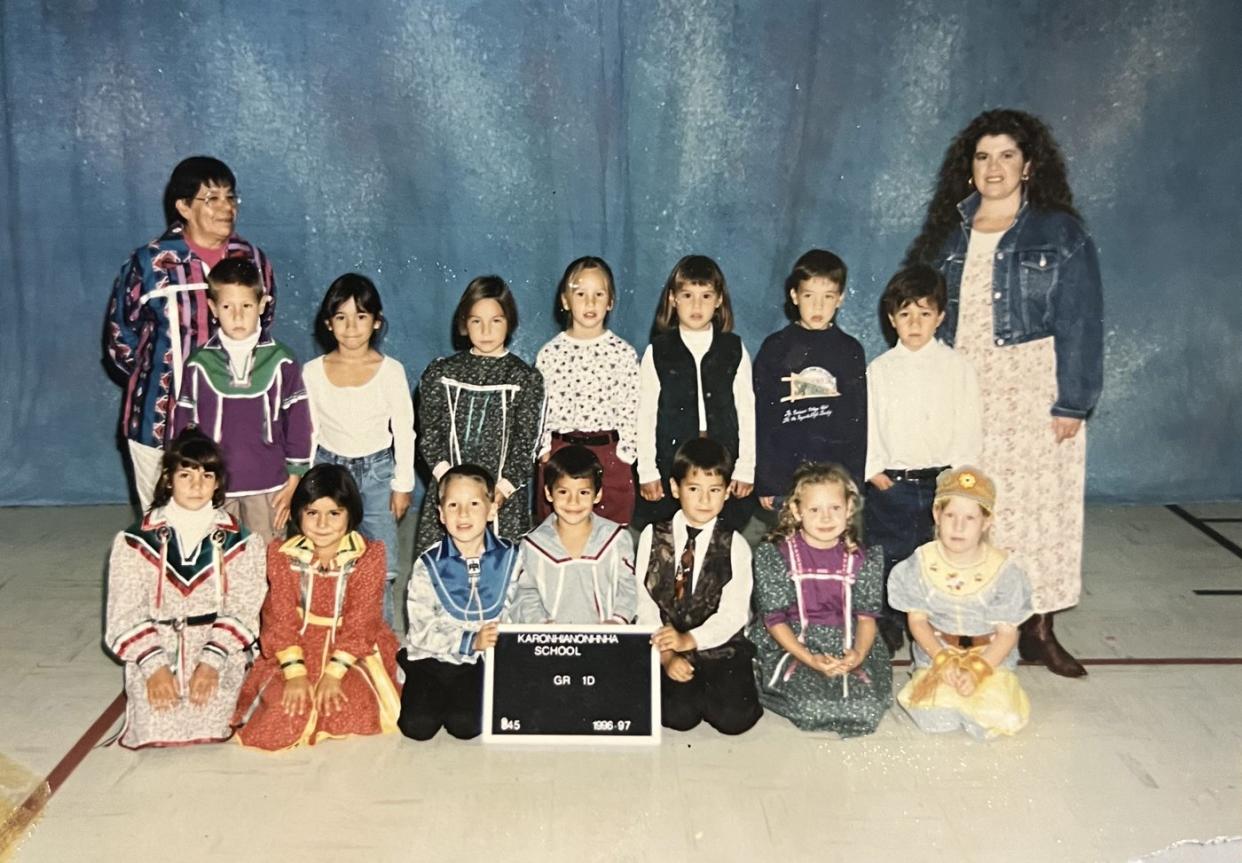Sharing Our Stories: Good and proud / Iakonhnhí:io tánon' iakora'sè:se'

We didn’t have our language in the schools for quite some time. It started with having Kanien’kéha one hour per week. It was the parents that wanted more language taught in school, but there was a lot of opposition. During that time, the parents formed the parents committee and took the education back from Quebec. They were the ones who pushed for our language and the ones who built the curriculum for how the schools are run today.
I worked at Karonhianónhnha' Tsi Ionterihwaienstáhkhwa' for 20 years, starting in 1989. When I started, they were struggling to find teachers. We had quite a lot of speakers back then but few that would teach. I began as a volunteer teacher’s assistant to help a friend of mine who taught social studies and science because he would sometimes be at a loss for words. As a first language speaker, they knew I could teach so after six months, I began teaching as a grade one teacher. Today, I see a huge change with our language. When former students see me, they speak to me in Kanien’kéha. It makes me feel good and proud to see so many people speaking today.
I made sure that we were always doing something different in school. It was not just writing, we made sure to bring in the language with everyday life, whether that be inside the classroom or outside doing an activity.
There were a lot of first language speakers when I started, we had a lot of people to go to for advice. Now, many people are coming to me.
*
Ken' nikarì:wes iah tekánerehkwe' tsi nitewawennò:ten tsi ionterihwaientsáhkhwa'. Tontáhsawen' thia'teiahia'khserá:ke énska nenkahwistà:'eke' Kanien'kéha wahshakotirihónnien'. Ronwatiien'okòn:'a ki' ne tehonatonhontsoníhne' sénha é:so owén:na' ahonwatirihónnien' tsi ionterihwaienstáhkhwa', nek tsi é:so tsi tekari'wakéhnhen ne thó:ne. Ne tho shontakahá:wi, ronwatiien'okòn:'a wahonnitiohkón:ni' ne ronwatiien'okòn:'a raotitióhkwa' tánon' sahonwatíhkhwa' ne Tianontarí:kon tahatiniarotáhrhoke' tsi ionterihwaienstáhkhwa'. Ronónha ki' iahatì:reke' akanákereke' tsi nitewawennò:ten tánon' ronónha wahonnón:ni' tsi wateweienstáhkwen tsi ní:ioht nòn:wa ioterihwahtentionkwenhátie' tsi ionterihwaienstahkhwaniónhkhwa'.
Tewáhsen niiohserá:ke Karonhianónhnha' Tsi Ionterihwaienstáhkhwa' ontió'ten', tióhton iawén:re tewen'niáwe sha'té:kon niwáhsen tióhton shiiohserá:te' takatáhsawen'.
Shontakatáhsawen', tehonatatiénhton ahonwatiia'tatshén:ri' ne shakotirihonnién:ni. Ken' niiá:kon ionhrónkha' iontionkwe'taién:tahkwe' ne thó:ne nek tsi tóhka'k niiá:kon enhonwatirihónnien'. Tewakatáhsawe' wa'thonkária'ke' ontiatén:ro shakorihonnién:ni wahihsnié:nen'. Tsi tewanákere' tánon' tsi ionhontsá:te' shakorihonnién:ni tánon' sewatié:rens enthotewennò:ktahse'. Tiotierénhton ki' nì:'i akewén:na', ronaterièn:tare' káti' enkkwé:ni' akherihónnien'. Ià:ia'k káti' niwenhnì:take óntohetste' sok takatáhsawen' énska kahiá:ton wa'kherihónnien'. Nòn:wa wenhniserá:te', katkáhthos tsi ní:tsi kwahtokèn:'en teiotténion tsi ní:we' tsi nitewawennò:ten. Nó:nen kherihonnienníhne' eniónkken', Kanien'kéha eniontewennón:tahkwe' enionkhtháhrhahse'. Konhnhí:io tánon' wakera'sè:se' akhé:ken' é:so iá:kon iontá:ti nòn:wa wenhniserá:te'.
Orihwí:io wa'kón:ni' tiótkon ó:ia' nahò:ten' ionkwaterihwahtentià:ton tsi ionterihwaienstáhkhwa'. Iah nek tekénhne' aiehiá:ton', orihwí:io wa'atión:ni' aontaiakwawennínion'te' tsi ní:tsi iatiónhnhe'. Tóka' tsi ionteweienstáhkhwa' nón:we akénhake' tóka' ni' átste' tánon' ok nitiakwaiéhrha'.
É:so ratíhne' ne tiotierénhton raotiwén:na' shontakatáhsawen', é:so rá:ti iontionkwe'taién:tahkwe' aiakhiniáhese' aontaionkhiiate'nikonhratkà:wen'. Nòn:wa, é:so iá:kon ionkeniahé:sen.
Story told by: Edna Kwatien:se Norton, Edited by: Owen Mayo - Local Journalism Initiative Reporter, Translated by: Sahawisó:ko’ Arquette, The Eastern Door


